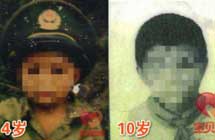人脸识别助力打拐 男子被拐27年后成功寻亲
人脸识别技术在科技圈里持续火热,各种人脸识别应用也层出不穷。百度公司日前利用人工智能人脸识别技术,已经成功确认一例走失儿童,父母与孩子DNA匹配成功并已相认。
A Chinese man who was separated from his parents as a child has found his family thanks to an online facial recognition system.
借助在线人脸识别系统,从小就与父母失散的中国男子终于找到了自己的家人。
Fu Gui, 33, was re-connected with his birth parents after using 'Baby Come Home', a Chinese website that helps people find their missing children.
通过使用“宝贝回家”这一国内寻亲平台,33岁的付贵找到了自己的亲生父母。

The website employs a facial recognition system which matches the portraits submitted by parents who are looking for their missing children and people who are trying to find their parents.
该寻亲平台借助人脸识别系统,匹配寻找丢失儿女的父母与想要找寻亲生父母的人提交的照片。
This is the first time in China a missing child and their parents have been re-connected with the help of facial recognition technology.
这是中国利用人脸识别技术首次实现失踪儿童与亲生父母的重聚。
The cutting-edge artificial intelligence (AI) technology was developed by Baidu, and has been used by 'Baby Come Home'.
“宝贝回家”使用的这项前沿的人工智能技术由百度研发。
The system was launched on 'Baby Come Home' in March and contains thousands of pictures of missing children across the country.
“宝贝回家”今年3月份开始使用这一系统,并在全国各地收录了数千张失踪儿童的照片。
According to a report on Huanqiu.com, Fu Gui's father, Fu Guangyou, and his family members had not stopped looking for him in the past 27 years.
据环球网报道,付贵的父亲付光友和其他亲人在过去27年里从未停止寻找付贵。
As his father recalled, Fu Gui was born in Chongqing in 1984 and went missing in 1990.
据付贵的父亲回忆,付贵1984年出生于重庆,1990年失踪。
In a bid to find his son, the man uploaded Fu Gui's information to 'Baby Come Home' and attached a picture of Fu Gui when he was little.
为了找到自己的儿子,他将付贵的资料上传到了“宝贝回家”网站上,还附上了付贵小时候的照片。
In 2009, Fu Gui, who was also looking for his family, registered on the same website and uploaded a childhood picture of himself.
2009年,同样在寻找自己家人的付贵也在这个网站上注册并上传了一张自己童年时期的照片。
The man had been renamed Hu Kui by his adoptive parents.
付贵的养父母将他改名为胡奎。
On his profile, Fu Gui stated that he was born in 1986 and he was separated from his parents in 1991.
付贵在资料中登记到,自己出生于1986年,1991年与父母失散。
Initially, 'Baby Come Home' failed to match the two parties due to the different information that had been put in.
最初,“宝贝回家”平台未能成功匹配双方,因为双方提供的信息不一致。
However, Fu Gui and his family's fate was changed after 'Baby Come Home' started using Baidu's facial recognition technology.
然而,当“宝贝回家”开始借助百度开发的人脸识别技术后,付贵和他家人的命运就发生了变化。
With the help of Baidu's AI technology, 'Baby Come Home' is able to quickly analyse the 60,000 pictures in its database.
利用百度的人工智能技术,“宝贝回家”能够快速分析其数据库中的6万张图片。
Using the system, the system would first compare the faces in the target and source images, then chooses 30 profiles that best fit the descriptions.
系统首先会对目标图片和源图片中的面部进行对比,然后筛选出30份最符合描述的个人资料。
In Fu Gui's case, his childhood picture was chosen by the system to be one of the 30 that looked most like Hu Kui.
在这次分析比对中,系统挑选出了与胡奎最匹配的30张照片,其中就有付贵儿时的照片。
'The first look we had on Fu Gui's profile, we had a feeling that it might be him. Not only did they look alike in pictures, their names are also quite similar,' said one of the staff at 'Baby Come Home'.
“宝贝回家”的一位工作人员说道:“我们第一眼看到付贵的资料,就觉得这个应该是了。除了照片像之外,还因为名字很相似。”
A DNA test was carried out to compare Fu Gui's biological information with his parents. The test confirmed that the two parties were a match.
随后进行的DNA测试,将付贵的生物信息与其父母的进行比较。测试结果表明双方有血缘关系。
The re-connection of the Fu Gui and his parents marked the first case in China for a missing child and their family to be matched with the help of facial recognition technology.
付贵与其父母的重聚是中国首次将人脸识别系统成功用于寻找走失儿童及其父母。